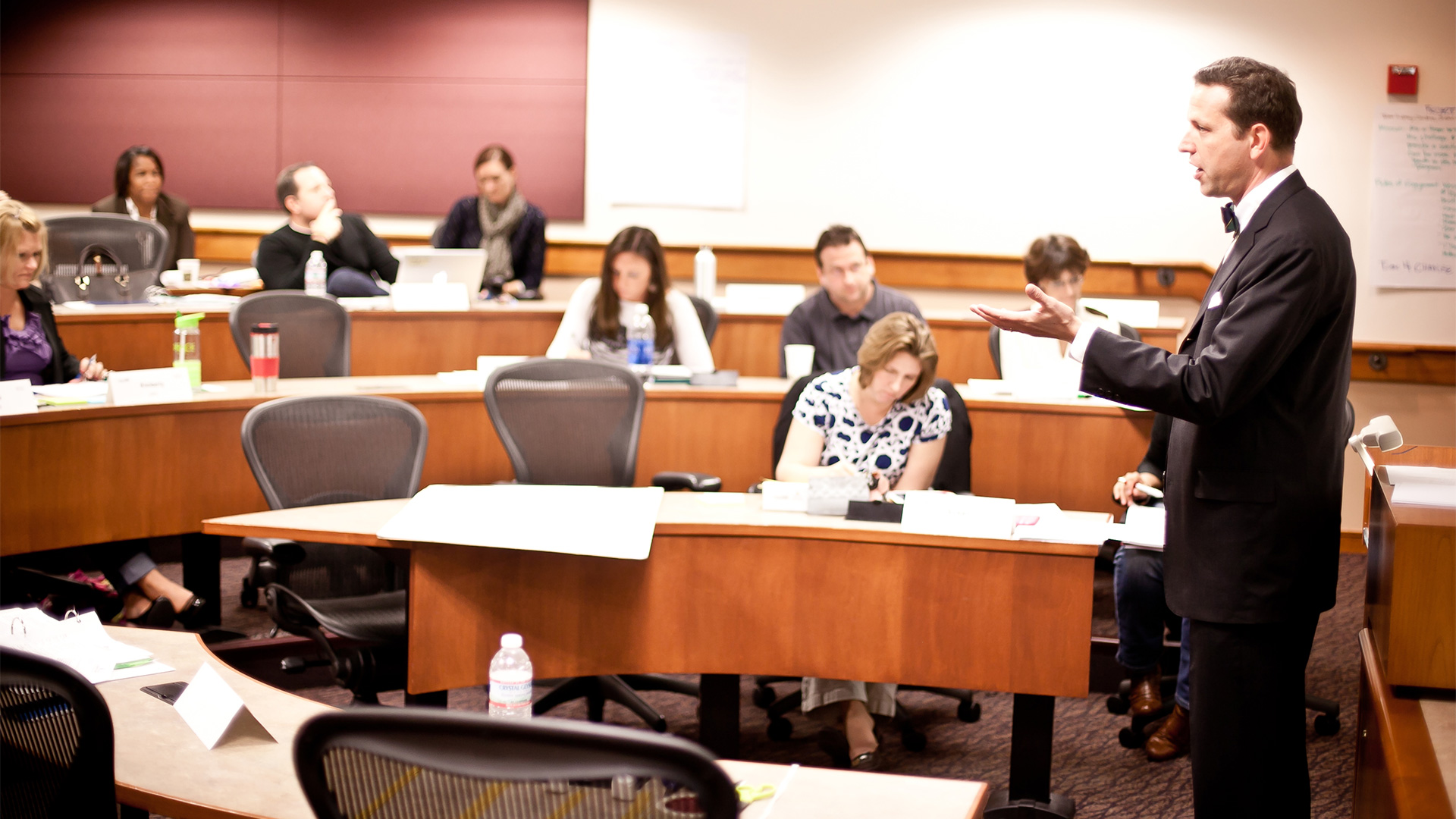Graduate Certificate in Technology Management
Graduate Certificate in Technology Management
Dive deeper than design thinking, understand innovation from the inside, and start engineering your enterprise's future.
Need a Tech MBA? Complete the certificate within a Full-time or Flex MBA as a second-year elective track.
Apply your learning for real-time impact in capstone consulting projects for federal labs and tech sector businesses.
The Smith Graduate Certificate in Technology Management prepares public and private sector leaders to identify, transition and leverage emergent technology into and across their organizations and markets. Through this unique program, you will join a diverse cadre of tech-oriented professors and peers to explore the practical challenges of technology development and adoption, learn best-practices in R&D management and innovation, understand the interface of public policy and private enterprise in science and technology, and craft strategies to cultivate emergent technology from concept to commercial use.
Valuable Outcomes
By the end of this program, you will be able to:
- Understand how new tech is designed, engineered, tested, and commercialized
- Identify/specify enterprise tech requirements and best practices in risk management
- Assess and plan market and mission strategies for emergent tech
- Model and manage the ethical implications of new tech
- Quantify the useful life of tech assets
- Use "lean startup" methodologies
What Students Are Saying
Lauren Flores
Cyber Technology Manager - NAM Demand & Supply Sites
Diageo
"My experience in the Smith Flex MBA and Tech Management program has proven to be an exceptionally enriching academic pursuit, providing unparalleled access to distinguished professors and the opportunity to collaborate with a remarkably diverse and accomplished group of peers."
Kayla Lesesne
Senior Analyst
FINRA
“I really enjoy the research and development aspect of this program. The world is changing towards a tech-focused structure and not many programs are built around that.”
Katherine Chorosinski
Senior Product Manager
UPS
"The Tech Management program at UMD has been instrumental in refining my ability to integrate AI innovations in product management, preparing me to lead tech initiatives that are both financially sound and ethically grounded."
Juan Paredes
Accountant
Financial Advantage Associates, Inc.
“I wanted to go deeper into how technology works. How a product is brought to a customer and how it’s created. It’s nice to see how it comes together, from research and development to marketing.”
Mildred Diggs
Founder and Registered Nurse
Journiy
"As the founder of a digital health startup, Journiy, the Tech Management program has been one of the best parts of my MBA experience. It's not only learning theories but practical tools I can immediately apply to my company."
Brandon Owens
Business & Sales Operations Manager
Microsoft
“They bring in actual entrepreneurs so we can hear the problems they’re facing and learn from their experiences.”
Shivani Pandey
Business Process Officer
Food & Drug Administration (FDA)
“The tech management course has really impacted the way I approach problems and how I get to the root of them.”
Michael Giron
Senior Consultant
Booz Allen Hamilton
“I work 9-5 throughout the week and then have my Flex MBA classes(on the weekday evenings), so the fact it’s on a Saturday works with my schedule.”
Adam Onderdonk
Operations Manager
Northrop Grumman
“I always look forward to what my classmates have to say. They all have unique experiences across so many different professional backgrounds.”
Sae Jeong
Contract Specialist
Acquisition Services @ U.S. Government Publishing Office
“My agency is going through a transition. As of now we’re working with paper companies but we will be switching to software. My job is to help with that transition and this program will help me earn a great understanding of business knowledge.”
Jared Bogdan
Captain
U.S. Space Force
“For people interested in emerging technology, this is an opportunity to make connections and learn the processes of how to do business in a field that has unlimited potential.”
Magnus Nilsson
Threat Intelligence Manager
Amazon Web Services
“By combining technology and business concepts across various disciplines, Smith’s Technology Management program gives students the tools to confidently navigate, compete and succeed in today’s complex business environment.”

Learn from UMD’s Best
Faculty from the Smith School of Business, the Clark School of Engineering, and the School of Public Policy give you a comprehensive overview of how technology is created, commercialized and managed.
#8
FACULTY (U.S.)
The Economist
Full-Time MBA ranking, 2021
Expert Faculty

Joseph P. Bailey

Timothy John Eveleigh

Judy Frels

Brent Goldfarb

Anil K. Gupta

Charles Harry

Saturday classes to fit your schedule
Attend cohort-based, in-person classes every other weekend at our convenient Washington, D.C., campus on Pennsylvania Avenue*, supplemented by self-paced online work. The program is completed in 10 months.
Take as a Stand Alone or MBA Specialty Track
Enrolled Full Time or Flex MBA students can choose to replace 2nd-year electives with technology management track courses to graduate with both their MBA and Certificate in Technology Management. Or new applicants can earn just the certificate, with the option to apply 14 credits to a Flex MBA later.
#5 ONLINE MBA FOR BUSINESS ANALYTICS | #9 INFORMATION SYSTEMS |

Who is right for this program?
Public and private sector leaders in need of broader strategic understanding and appreciation of the new economics of data, competitive innovation, and disruptive emergent technologies. This program is ideal for:
- Public and private sector program executives and directors
- U.S. national security leaders, planners, and program managers
- Federal contractors supporting government acquisition and modernization efforts, reforms, or industry partnerships
- Private sector consultants on technology applications and organizational redesign
- Digital strategists, data scientists, cyber technicians, and security technology professionals
- Start-up founders and aspirants
Not all competitive candidates need to be currently working in technology fields or have specific STEM credentials. However, the curriculum demands a strong interest and aptitude to understand technology concepts, processes, and applications.
Academics
Courses
Classes are held on alternating Saturdays, and each Saturday will have both a morning class that runs from 9 a.m. to 12:30 p.m., and an afternoon class that runs from 1:30 to 5 p.m.
Contemporary strategy, management approaches, and best-practices for research and development. This course focuses on private sector methods to manage technology programs, identify and specify technical requirements, communicate technology use and value, and assess new technologies and architectures. It includes instruction on technology scouting and assessing Technology Readiness Levels (TRLs). Through engagement with experts in creating and managing technology, participants are also exposed to human and behavioral factors that can influence technology adoption in the commercial and public sector.
Best practices and challenges in organizing and cultivating new ideas into successful public and private sector technology ventures. This course provides an integrated strategic framework for innovation-based entrepreneurs and technology professionals. It is structured to provide a deep understanding of the core strategic choices facing startup innovators, a synthetic framework for the development and implementation of entrepreneurial strategy in dynamic environments, and the ability to scale those ventures over time.
Systems engineering approaches to the definition, design, development, implementation, integration, verification, and validation of successful systems. Taught by faculty from the Clark School of Engineering, this course exposes technology managers to the critical collaboration between business leaders and IT leaders in the early stages of program definition and how to effectively leverage and assess business-driven enterprise, product, and program development. It covers contemporary product lifecycle phases and the systems engineering technical processes associated with research and product development organizations in industry and government. It also explores currently popular development methodologies such as incremental, spiral, evolutionary, lean, and agile and how these are driven by concept and requirements development, systems analysis and modeling, and system architecting and are measured by technology prototyping, research validation, technology testing, and program/product evaluation.
Application of financial management principles and techniques to science and technology investments and research and development projects. This course enables technology managers to estimate return on investment of R&D projects, value technology assets, quantify risk and make sound replacement and upgrade decisions for S&T projects. By the end of the course, participants will be able to build financial models and make presentations to senior executives explaining the value creation potentially arising from investments in R&D and new product development, as well as infrastructure necessary to sustain the enterprise.
Challenges and best practices of successfully marketing emergent technologies. This course begins with a discussion of past successes and failures in marketing emergent technologies, followed by a study of the effective approaches and frameworks that help technology managers identify and understand customer needs. Participants also focus on analyzing how identified customer needs can guide design and development of emergent technologies, how to translate customer needs and market conditions into effectively positioning emergent technologies, and maximizing success in converting new technologies to market or mission-ready products.
A mastery session consisting of a series of intensive in-class lectures/discussions and a tabletop simulation focused on the cyber threat landscape, motives and effects of threat actors, methods and challenges to measuring cyber risk, and optimizing resource allocation in the defense of complex organizations. Taught by faculty from the School of Public Policy and Information Sciences, this course will explore the range of technical complexity, and their vulnerabilities, introduced in modern organizations including the integration of Internet of Things (IOT), Industrial Internet of Things (IIOT), cloud computing, and other distributed systems. It will also expose participants to the process of hacking; categorizing and defining the range of threat actors and motives including criminal organizations, nation states, and hacktivists; analytic models and methods to quantify primary/secondary effects of cyber-attacks on organizations; analytic methods to quantify societal effects of cyber-attacks on interdependent organizations; and consolidating and visualizing complexity in organizational risk and techniques for translating technical vulnerabilities in systems to the operations they support.
A mastery session consisting of a series of intensive in-class lectures/discussions on issues surrounding corporate structure and law relevant to technology business, development and innovation. This course will educate participants on the range of legal mechanisms by which enterprises can market and manage technology solutions, understanding decisions and outcomes associated with technology from merger and acquisition activities, and accounting for legal management and protection of intellectual property (IP).
As technology provides us with new opportunities, it also presents new ethical questions, such as privacy, or new dimensions to familiar ethical questions that must be addressed in order for society to recognize net gains from these advancements. This course focuses on raising participants’ awareness of the ethical dimensions of technological advancements. Structured as a mastery session consisting of a series of intensive in-class lectures, discussions and case studies, it addresses anticipating common ethical dilemmas faced by technology managers, anticipating the most common reasons and rationalizations one would encounter when proposing the organization do the right thing, and then exploring one’s own personal communication style, risk aversion and purpose in order to find an appropriate way to attempt to influence the organization to do the right thing.
Experiential practicum to apply the skills and learning outcomes accumulated throughout the Technology Management curriculum toward solving real-world problems and cases. Projects will be chosen and executed in teams, and when possible sponsored by student employers or school public and private sector partners. Project selection and maturation receive iterative faculty facilitation.
Admissions
We welcome ambitious, highly motivated professionals who seek a rigorous academic program taught by our world-renowned faculty in a supportive environment. Applicants are accepted on a rolling basis.
Admissions Requirements
Enrolled Full Time or Flex MBA Students: Internal screening during Year 1 of enrollment in the MBA program. Applicants must submit an updated resumé and statement of purpose.
Certificate Only Students: Application for admission must include a resumé, essay, recommendation letter & previous academic transcripts.
Important Dates Apply Through: July 1, 2026 First Class: August 31, 2026 Completion: June 2027 | Standard tuition for enrolled MBA $24,260 for certificate only (estimated tuition + fees) |
Information Sessions
There are no upcoming events at this time.
Smith Tech Management in the News
- University of Maryland MBA Students Recommend a Solution for Space Junk With NASA Technology
- MBA Students Collaborate with Federal Lab Consortium in Unique Tech Capstone Experience
- Federal News Network: Why a Space Force Captain Went Back to School
- Federal News Network: Teaching Feds to Manage Latest Technology
- Federal Labs: FLC brings lab connections to UMD tech management certificate program
- Daily Record: UMD Smith School Launching Tech Management Program
- Tech Management MBAs Consult for Real Tech Solutions